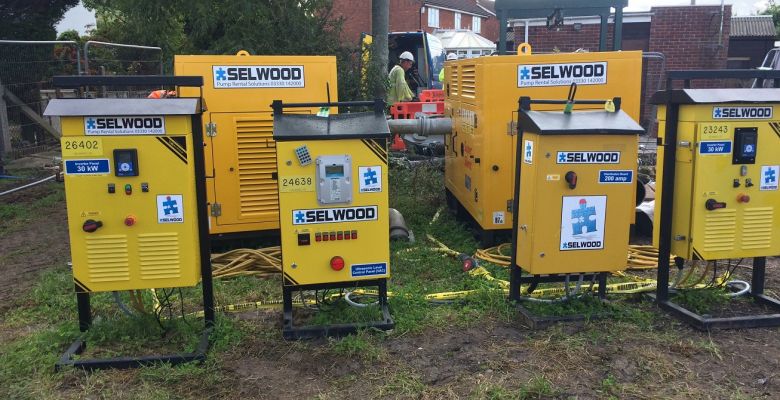The Background
Wessex Water’s Brent Knoll Flood Relief scheme included construction of a new sewage pumping station (SPS), decommissioning of two existing ones and the refurbishment and modification of another to relieve flooding issues experienced in the village of Brent Knoll, on the edge of Sedgemoor, Somerset.
Part of the project required an installation to overpump sewage while works were carried out to make improvements to several sewage pumping stations.
The Challenge
The refurbishment of Forge House SPS required replacing existing 50-year-old pumps with modern and efficient pumps which increased flows and improved reliability. The wet well had to have benching replaced, so it needed to be isolated for the anticipated duration of the works. The motor control centre was also being upgraded at the same time, meaning the existing mains supply could not be used. It was agreed that overpumping would be required to keep the SPS operating without causing any impact to the local community.
A conventional solution using traditional submersible pumps would have required the demolition and rebuilding of a manhole in order to install the equipment – a costly and time-consuming process.
Wessex Water’s site manager, James Chinn, contacted the Selwood framework manager, Phil Ingleheart, to request a site visit and discuss the site-specific requirements and challenges.
Discussions were held on site looking at various options. Due to the site restrictions, a traditional diesel driven pumping option was ruled out due to potential issues affecting water courses close by. There was not enough room in the wet well to place traditional electric submersible pumps, and a quieter solution was requested by the client due to the proximity of residents’ houses nearby.
The Solution
Selwood’s engineers were able to use brand new S150 Super Silent Electric pumps which were small enough to be deployed without expensive works being carried out. The pumps, capable of 100mm solids handling, are the product of choice for water companies when dealing with sewage. The electric-driven end suction pumps, which are even quieter than Selwood’s market -leading diesel-drive Super Silent S150 model, also significantly reduced sound levels reaching nearby residents.
Wessex Water operations required a fully automated duty/standby overpumping arrangement backed up with remote telemetry which could match the pumping duty required and reduce the risk to the environment without causing disruption to local residents.
The Result
The Selwood overpumping system was controlled by ultrasonic transducer head and variable speed control panels which adjusted the pump speed to match incoming flows. The entire system was installed and programmed by Selwood’s in-house electricians, saving money for the client by only using the required amount of power and fuel to run the pumps. Further benefits to the client included reduced day to day checks, reduced sound output especially at night when flows drop off, increased efficiency and lower environmental impact due to the system’s ability to ramp up or ease off depending on incoming flows.
The Recommendation
James Chinn, the site manager, said: “This was a really good system which was hassle free and backed up by automated telemetry. The provision of live information was very reassuring for everyone involved”.

